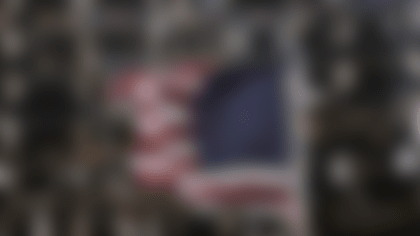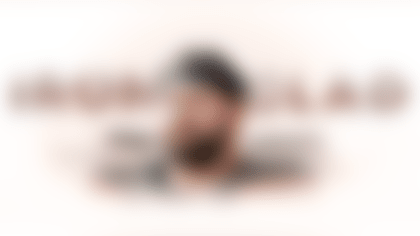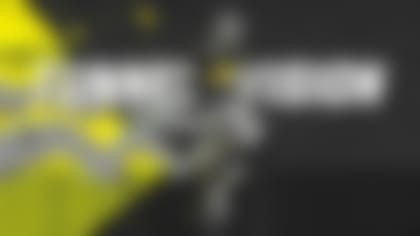MICHAEL SILVER
Aug. 26, 2015
When Deuce McAllister and I saw the semi out the window, midway through an improbable, emotional journey from Jackson, Mississippi, into the wake of a horrific storm, neither of us gave it a second glance. The New Orleans Saints' standout running back and I were in the back of a green Chevy Astro van, being driven toward the submerged Crescent City by three Salvation Army rescue workers who had just moved us through a military roadblock. The two of us were quiet and contemplative, reeling from two days' worth of chilling conversations with battered Hurricane Katrina survivors, and bracing ourselves for the disturbing images we were sure to witness.
Our driver, Maj. Mark Woodcock, gestured toward the truck. "You see what it's hauling?" he asked. We looked back at the semi and simultaneously gasped. "Yeah," Woodcock said. "Those are coffins."
In the immediate aftermath of one of the worst natural disasters in U.S. history, McAllister and I experienced a dizzying gamut of emotions that, 10 years later, remain vivid and indelible: fear, anguish, helplessness, anger, sadness, confusion, empathy, bewilderment. Later that day, I would become the first outside sports journalist -- and one of the first outside journalists, period -- to venture into New Orleans following Katrina. As the minivan transported us to Louis Armstrong International Airport, then to the Superdome and finally into the heart of a brutalized city, a Sports Illustrated writer and a football star with whom he was previously unacquainted forged an implicit and intense bond. In the process, McAllister and I gained insight into just how terrifying the experience had been for those who endured it, and how maddening it was that it had taken so long for help to arrive. And, against all logic, we came to view the sport responsible for placing us there in an entirely new light.
The stories we heard from survivors were haunting, but not entirely unexpected. What blew us away, however, was the way some of them clung to football in their time of distress. Like his teammate Joe Horn, with whom I had visited evacuees in the Houston Astrodome the previous day, McAllister initially believed that the displacement of the Saints was a trivial and ancillary matter in New Orleans' time of need. Skeptical as the three of us might have been, we all felt otherwise after spending time with the beleaguered but resilient locals we encountered.
To some of those hardy souls, the Saints, already rumored to be plotting a move out of the city with which they were inextricably linked, somehow provided a connection to the real world at a time when reality had turned scary and surreal. And the following Sunday, when they went to Carolina as heavy underdogs and shocked the football universe with a dramatic, last-second victory, McAllister, Horn and their teammates understood that they were providing a small but important measure of comfort, pride and pleasure for a populace enduring something unfathomably harsh.
So yes, even as people were sleeping on mattresses atop the interstate, wading through chest-high water in search of food and medicine and frantically waving their arms at rescue helicopters while standing on rooftops, football mattered -- a notion that McAllister, Horn and I never would have believed had we not seen, heard and felt it for ourselves. And earlier this month, as the two since-retired Saints (each of whom still lives in the New Orleans area) and I revisited the site of that terrible tragedy and relived those disconcerting experiences, it didn't take much prompting for us to access those loaded memories.
"As we talked to people and heard their stories, I remember thinking, 'This can't be real,' " McAllister recalled on a sweltering Sunday afternoon, shortly after we'd returned to the airport lobby that, a decade earlier, had been converted into a triage area resembling a military hospital in a combat zone. "And as they spoke, the thought I kept having was, 'Do you understand what you're surviving? Do you understand what you're going through?' Because it just didn't seem possible that this could be happening in America. But it did. And it seems just as unbelievable now as it did then."
When Katrina descended upon the Gulf Coast, the Saints were in Oakland, preparing to close out their preseason with a road game against the Raiders. My SI bosses sent me to the Coliseum with no specific instructions -- essentially, I was tasked with getting into the Saints' world and giving readers a sense of how they were coping with the tumultuous state of affairs. After the Thursday night game, head coach Jim Haslett gave his players 72 hours to get their affairs in order before reporting to a River Walk hotel in San Antonio, which would become the team's temporary training headquarters for the 2005 season.
The first person I approached in the locker room was Horn, the flamboyant wide receiver with whom I already had a pre-existing bond. He was on an understandable rant against the Bush administration's painfully slow response to the disaster ("How 'bout the government? Five days! Where they been?") that quickly grew into a passionate tirade against the "L" word: "These people were left there for days by the government, with no food or water, just trying to survive. Hell, if I'd been trapped there, you'd be calling me a looter, too. Picture watching your little sister drown and you're scared and hungry and you don't have any shoes, and now two hours later you see a Wendy's or a Footlocker. What would you do? You know what I'd like to say to everyone stuck there? Loot my house. Seriously, I have a nice house in Destrehan that's full of stuff, and anyone who wants it can have it. Go on in and take my flat-screen TVs and raid my refrigerator. Whatever."
And then, lest you think he was grandstanding, Horn gave me his address, adding, "Print that
Horn told me to meet him two days later in Houston, where he planned to visit the Astrodome, which was serving as a temporary shelter for thousands of evacuees. (The "R" word -- refugee -- was also a trigger point: "These are American citizens!" Horn said, incredulous. "How are people gonna call 'em that?") When we got there, it was free-form: We simply walked into an open door and started going cot-to-cot. Horn's original plan had been to "start handing out hundred-dollar bills," but the banks hadn't yet opened -- and he quickly realized that his mere presence carried immeasurable value.
"Some of them just wanted a hug, man," Horn remembered earlier this month as we sat on the doorstep of a home in New Orleans' Upper Ninth Ward on a muggy Sunday evening. "And the stories we heard -- it was tough to imagine what they had gone through. They were just trying to survive. Football didn't mean [expletive] to me when I got out of that car. I wanted the NFL to cancel our season and give us the opportunity to decide -- to come put our feet in the water, in the sewage water up in the city, because that's what I wanted to do. I didn't care; I'm from the gutter. I couldn't sleep at night, even years later, because I was like, sometimes, 'I should've done that.' "
Instead, Horn touched hundreds of evacuees, giving them a sense that the outside world did, in fact, care about their plight. He listened to their stories. One young man who'd been at the Superdome spoke of the makeshift shelter as a house of horrors: "No lights, no water, people getting shot." A woman from New Orleans East showed him photos of her flooded neighborhood, then recalled hoisting her 15-month-old daughter over her head in chest-high water just before rescue workers arrived. Another man told of being stranded atop a roof with 17 others, eventually swimming toward a Walgreens in a successful attempt to secure insulin for an uncle with Type 2 diabetes.
As we walked around the crowded Astrodome floor, names of the missing flashed on the scoreboard above; there was also a large bulletin board overrun with leaflets bearing the images of lost family members. Among the items Horn was asked to sign: a pocket bible, a dirty pillow, a baby's onesie and, hauntingly, a man's photo of his missing wife.
Through it all, Horn was the emblem of encouragement, telling evacuee after evacuee, "Hey, the water's gonna go away. ... We're still gonna have our crawfish boils. ... Take care of each other. ... We're gonna rebuild. ..."
At the time we tried to go to Carolina and go out and give those people three hours of joy, but I don't think we really understood it. As time went on I began to understand exactly what this team means to the city - the endearment that the fans have for this team. Deuce McAllister
What caught him off-guard was that, amid the positive reinforcement, many of the downtrodden people he encountered managed to boost his spirits, too.
"People kept coming up to me and wanting to talk about football, about the Saints," Horn remembered, his voice rising. "It was all they had. I felt like [they were saying], 'We're gonna be alright because we know how to survive ... We know how to take care of our families and survive because that's what we do.' We need you to represent, to rep the boot! That's what one guy told me. Represent the boot. And that's when my whole attitude went strictly to ... do what we need to do."
It wasn't that simple, of course -- as Horn noted at the time, many of the evacuees might have been putting on a brave front, if only for the benefit of their shell-shocked children -- but it did change his mood, quite perceptibly. And as we left the Astrodome and prepared to head our separate ways, Horn's parting words were, "I feel way better now, man, because I see kids smiling. These people supported the New Orleans Saints when the water wasn't there, and now I'm here to support them. I came because I wanted to feel their heart. And what I found was that they still want us to win -- maybe because that's what they have to hold onto. I can take that back to the guys on the team. Now I can go to Carolina [where the Saints would open the regular season nine days later] with a clear conscience."
After saying goodbye to Horn on that Saturday afternoon a decade ago, I went straight from the Astrodome to the airport, boarding a flight to Jackson and connecting soon thereafter with McAllister, along with teammates Fred McAfee and Mike McKenzie. Of the three, McAllister was the one I knew least; yet, my instincts told me he was the Saints player most worth shadowing.
If Horn was the epitome of raw emotion -- we'd been introduced by a mutual friend, former All-Pro wideout Andre Rison, which should tell you all you need to know -- McAllister exuded wisdom and maturity beyond his years. Just 26 at the time, McAllister, a Mississippi native who'd starred at Ole Miss, already owned several businesses, including a car dealership in Jackson. When we'd spoken after the Thursday night game in Oakland, he'd given me his cellphone number and told me he'd be happy to have me tag along.
Two days later, as we headed off to visit the first of several shelters housing evacuees in the general vicinity of Jackson, he'd dropped into conversation, almost as an aside, "I might know some people who can get us a little closer to the city."
In the meantime, we went to a church in Byram, Mississippi, and heard a steady stream of harrowing stories from evacuees. A one-legged man asked the three Saints players to sign his wheelchair. McAfee told me about how, while watching "Nightline" before nodding off the previous night, he'd seen footage of his 5-year-old niece disembarking from a military helicopter with her grandparents. After five days of being trapped in a house, they'd been dropped off at a makeshift staging area on Causeway Boulevard in Metairie, Louisiana, near the Saints' training facility -- a positive development, but still far from ideal.
Suddenly, we heard a commotion and went outside to witness an incredible sight: A young man named Vernon Dotson Jr., who'd been missing for six days, emerged from the passenger seat of a car and was reunited with his parents, as onlookers cheered wildly. The joy and relief on the face of his father, Vernon Sr., is an image I'll never forget. Vernon Jr. simply looked spent, emotionally and physically. I introduced myself and asked where he'd been. "Ninth Ward," he said. Where had he slept? How had he eaten? What horrors had he confronted? "I survived," he said. "What I did, I can't say."
If these interactions had been the extent of my journalistic endeavors that weekend, I'd have been profoundly touched by the experience. In reality, this was just the opening act. The next morning, McAllister met me for breakfast and said, "You might want to get some food in you, because we could be gone awhile." He'd connected with some Salvation Army officials who, by virtue of their rescue-worker status, would be able to get us close to New Orleans. The idea was that we'd swing by McAllister's house in suburban Destrehan to assess the damage -- though that would turn out to be a mere footnote.
A week earlier, these Salvation Army workers had been deployed along the Gulf Coast in the areas initially ravaged by the storm, before the levees in New Orleans were breached and Louisiana became the focal point of relief efforts. During the drive, one of the workers took out his digital camera and began showing us photos of the wreckage near Biloxi, Mississippi. One particular shot caused us to pause: A massive pile of debris, with a dark, lifeless arm sticking out of the side.
"Oh my God," we whispered, almost in unison.
As we closed in on the outskirts of New Orleans, our driver, Woodcock, turned to the two of us. "You guys want to go to the airport?" he asked.
Deuce and I locked eyes. "Uh, yeah," he said, as I nodded along with him. Damn right we wanted to go, though given the scenes we imagined might await us, we were simultaneously eager and apprehensive.
"And that," McAllister recalled a decade later, "is when things got real."
Retracing our steps a few weeks ago -- this time, we had a camera crew in tow; back in 2005, still photographer Bill Baptist had provided the visuals -- McAllister and I didn't need much prompting. I'd gone through my decade-old notebooks and re-read all of the SI and SI.com stories, but most of it was still in my head. McAllister, too, had incredible recall.
We drove up to the terminal, where, 10 years prior, trash and emergency vehicles had dominated the roadway -- at the time, McAllister had invoked the film "Hotel Rwanda" as a comparison, and it hadn't seemed like an exaggeration. Then we entered the airport and found the lounge area, which, back then, was being used as a triage area. "The bodies, the stench ... that nasty, dirty smell," McAllister remembered, shaking his head. "Obviously we saw some that were deceased, but then they were trying to save a lot of them, and then you had some that just wanted to find the rest of their family."
A few minutes later, we headed downstairs to the baggage claim, where perhaps the heaviest conversation of all had taken place a decade earlier. In 2005, when we'd first encountered the dreadlocked man and his similarly hairstyled adolescent son, who were waiting (like many others) to be evacuated from the airport, the interaction had been relatively lighthearted: Michael Verrett had playfully punched his son, Michael Jr., while exclaiming, "Hey, Deuce -- over here might be the next superstar Saints running back." Then, turning to his slender child, Verrett continued, "See, I'm telling you, look at this man. If you want to be a running back, you've got to eat."
Eventually, McAllister and I heard Verrett's terrifying tale of survival, and we stood there in stunned silence and took it all in.
Verrett and his son had spent most of the previous six days at Charles R. Drew Elementary School in New Orleans' Bywater neighborhood, where a limited food supply had been a constant worry. "Some of us swam to our houses and got butane tanks and pots and pans and brought 'em back, and we took car batteries and cut the wires to set it up so we could cook ... giant pots of beans. We fed the elderly and children first. I was hungry many nights, but as long as I saw this guy here lying down with something in his stomach, my stomach was full."
I could write an entire column recalling our conversation with Verrett; what's truly disturbing is that his story was far from unique. When he spoke of forming, with other men at the shelter, a makeshift police force to keep outsiders from taking advantage of the situation -- "We had some bad things happen," he said -- the conversation turned nauseating.
Verrett spoke of a prominent New Orleans singer who "opened her house, gave us all the food and water. To show she supported us, she came over to the shelter and slept among us, on the roof. But then a couple of guys got carried away. ... We got rid of them the next day. We weren't having that. The other men and I had to be soldiers and join together to protect our women. We spliced the battery wires and set up lights where the women were sleeping so it wouldn't happen again."
Sure enough, shortly after being rescued and evacuated, the singer in question gave a television interview detailing her post-Katrina ordeal -- and essentially mirrored Verrett's account, saying, among other horrors, that she'd been sexually assaulted (and finally escaped the city by driving a stolen bus packed with fellow evacuees to safety).
Recalled McAllister: "You had so many people who were just true, true heroes, and I remember them telling us about how they were in a school and had to protect the women and the children, and you had bad people out there that wanted to harm them. And them just swimming through water, gunk and going to get food ... Just the thought of it ..."
More memories came rushing back when McAllister and I went back outside and looked out onto what, 10 years ago, was the tarmac (and was now partially obscured by a newly constructed building): We'd seen military helicopters landing, with evacuees disembarking, most of them carrying their belongings in Hefty bags, unable to walk. Baggage carts were being used to transport the evacuees from the helicopters to the airport entrance, where they were taken to a triage area; others were being transported from the airport to the tarmac, where they would board planes bound for various locations. At one point, we saw a man fall off the moving baggage cart and onto the asphalt as other passengers screamed; he lay there on his side for about 30 seconds before he was spotted by some soldiers and helped into a wheelchair.
At the time, McAllister and I thought we'd seen the worst of it. Yet upon leaving the airport, Woodcock had asked if we wanted to try to get into the city, which was basically a rhetorical question: At that point, there was no turning back.
Because of the flooded streets, we'd taken a circuitous route into town and ended up on a raised section of Interstate 10, overlooking the infamous Calliope projects and the badly damaged Superdome. I remember watching a white man walk by with a backpack over his bare torso, a dirty shirt atop his head and a baseball bat in his left hand. I can still picture the dead dog lying on its side in a small pool of water below, a block away from a row of submerged cars. On the freeway, we walked past discarded food wrappings, old blankets, rubber boots and a tattered teddy bear.
"I don't know if you remember seeing it," McAllister said, "but as we came in on this bridge, there was a Kentwood truck and all the water had been taken out. It had been hijacked. That was deep."
I remembered. And there was no question that both of us remembered what had happened next: Still on the raised interstate, we'd stopped in the heart of the city -- overlooking the intersection of Canal and Claiborne -- and looked out at murky water that led all the way to the Mississippi River in one direction (toward the French Quarter and downtown) and as far as the eye could see in the other.
And it was there that the magnitude of the devastation truly hit home.
We saw people in boats, seemingly trolling for loved ones, dead or alive. We saw two women repel rescue efforts and wade 500 yards through the water to their "own, private boat" -- only to discover that the aluminum vessel was padlocked to a fence. We entered an abandoned city bus atop the freeway; a man had taken refuge inside. With military helicopters on both sides of the interstate having hemmed in our van for the time being, we weren't going anywhere for awhile -- and neither was he. The path to evacuation was only about 20 yards, but the man wasn't having it: McAllister spent 20 minutes trying to coax him out of the bus, but he refused to leave.
As they spoke, the thought I kept having was, 'Do you understand what you're surviving? Do you understand what you're going through?' Because it just didn't seem possible that this could be happening in America. But it did. And it seems just unbelievable now as it did then. Deuce McAllister
"I'm not going anywhere," he declared. "Just find me some batteries, and I'll be fine."
After a week in survival mode, the stress of the situation seemed to have overtaken many of the people we encountered. One elderly man on the sixth floor of a residential hotel across the freeway opened his window, gestured to us and asked, "Do you have a Sunday paper?" McAllister gestured toward a rescue boat in the vicinity, telling the man he could flag it down to "take you up out of here." After a few seconds, the confused-looking man replied, "I sure would love to read that paper."
We couldn't convince him to leave, either.
At the time, and in the immediate aftermath, that was the moment that resonated most, to both of us. Yet a decade later, as we stood in the vacant dirt lot where the since-razed residential hotel once stood, it was another interaction to which McAllister kept coming back.
"We were right up there on the [interstate], and this gentleman in a wheelchair, who was so old and tired, was being rescued," McAllister recalled. "They had to help him onto a stretcher and up to the helicopter. And I was just talking to him, and he was telling me a little bit about what he had been through to survive to get to that point.
"Then his grandson came over, and one of the first things that he asked me was, 'Did you beat the Raiders?' And I'm thinking to myself, 'Man, you're talking about a preseason game? ... You've been trying to survive for days on a rooftop, and that's a lot more important.'
"At the time, we tried to go to Carolina and go out and give those people three hours of joy, but I don't think we really understood it. As time went on, I began to understand exactly what this team means to the city -- the endearment that the fans have for this team."
Even before Katrina forced them to be nomads for the entire 2005 season, the Saints were in a precarious place. Four months earlier, owner Tom Benson had broken off negotiations with Louisiana officials for a long-term lease tied to major renovations of the Superdome. There was a legitimate fear among the local populace that the franchise would relocate to San Antonio (where Benson owned a home) or Los Angeles.
"Oh, without a doubt," Horn recalled as we sat on the steps earlier this month. "And after Katrina, people said, 'The Saints will never be in the Dome again.' "
Horn, who owns and operates a Louisiana-based company, Bayou87, that specializes in signature barbecue sauces, has a great affection for the region -- and in those dizzying days after Katrina hit, he made it his mission to ensure that his teammates understood what was at stake.
I wanted the NFL to cancel our season and give us the opportunity to decide - to come put our feet in the water, in the sewage water up in the city, because that's what I wanted to do. I didn't care; I'm from the gutter. I couldn't sleep at night, even years later, because I was like, sometimes, 'I should've done that.' Joe Horn
As they prepared to open the season against the Panthers, who were a trendy preseason Super Bowl pick, the Saints players were heavy-hearted -- but there was also a healthy dose of anger floating through the locker room. Many were mad that the NFL had already relocated their "home" opener in Week 2 to Giants Stadium, effectively giving the team a ninth road game; others were upset that the game against Carolina was being played, period. When NFL Commissioner Paul Tagliabue asked to address the team the night before the season opener in Charlotte, he was rebuffed.
Instead, Haslett read the players a letter from then-New Orleans mayor Ray Nagin, speaking of the "scenes that looked like they were out of a horror film" he had witnessed, and how much the team meant to the region. Both Horn and McAllister told teammates about the storm survivors they'd encountered who'd encouraged them to play their hearts out for the city.
Then, on Sunday, the Saints took the field and stirred the emotions of sports fans across the nation, and beyond.
New Orleans rode a pair of McAllister touchdowns to a 17-7 lead, only to squander the advantage, as the Saints had done so many times throughout their history. It was tied at 20 when they got the ball back at their own 22-yard-line with 59 seconds to play. Horn caught an 11-yard pass to start the drive; three snaps later, he took the game into his own hands, literally, snatching an Aaron Brooks spiral out of a crowd at the Carolina 37 to set up John Carney's game-winning field goal as time expired.
Up to that point of his long career, Horn's signature moment had been somewhat farcical: pulling out a cellphone from the goal-post padding to celebrate a touchdown on "Sunday Night Football" at the Superdome two years earlier. But then, at 33, Horn left a far more lasting impression -- and everything about this catch was dead serious.
"I knew there was a time -- you know when your time is there, a new window of opportunity in your life, you'll never see it again," Horn recalled. "And when that ball was in the air, it was like slow motion, man. This is the honest-to-God truth; it was like slow motion. It was, Joe, this is the play right here to get John Carney where he needs to be to win this game. Drop this ball, you act like you can't catch it because it's high, you act like you gonna get knocked out if you catch it -- that's all fake. The fans are watching you right now. Big Mouth Joe Horn, who likes to talk ... step up and show what you're about! If you're really down with us, make this play. If you don't make this catch, you're a buncha false chatter. You just wanna be on the camera to get nationally known.
"That's how I saw it in slo-mo, and I had to have it."
As Carney's kick slipped inside the left upright and the Saints rushed onto the field to celebrate, sports fans everywhere had lumps in their throats, and so many Louisianans had a small measure of respite. Yet for Horn, the victory was bittersweet.
"It brought a little comfort," he remembered. "It felt like the people that were watching, it gave them a sense of relief, like, 'Oh, we have something to cheer for.' But it wasn't total comfort, because I wasn't here. I should've been in my home, going around to make things in this city better -- instead of just [playing] football. So it was some happiness for me while I was on the plane to San Antonio, but there was still sadness."
Predictably, Horn and his teammates could not sustain their storybook performance in the face of displacement and disaster -- New Orleans won just two more games the rest of the way, and Haslett was fired after the season.
Yet over the balance of the decade, Saints fans would be treated to a rollicking ride of triumph and pride, from the team's dramatic return to the Dome the following September (featuring Steve Gleason's iconic punt block in a "Monday Night Football" victory over the Atlanta Falcons); to the season-long magic summoned by rookie coach Sean Payton and his handpicked quarterback, Drew Brees, who led New Orleans to the 2006 NFC Championship Game; to the franchise's first championship three years later, culminating with a Super Bowl XLIV victory over New Orleans native Peyton Manning (son of longtime Saints quarterback Archie Manning) and the Indianapolis Colts.
McAllister, released by the Saints following the '08 season, got to experience that title in a ceremonial role -- he'd been re-signed to serve as an honorary captain for the team's first playoff game and remained on the roster, though he was inactive for the entire postseason. Horn, who'd asked for his release following the '06 season and spent his final year with the Falcons, was long gone by the time the confetti fell.
The Saints, however, have remained in New Orleans -- something that seemed highly improbable in the brutal aftermath of Katrina. It might be a stretch to say that the tragedy underscored the team's importance to the region, leading Benson and the NFL to recommit to New Orleans, but 10 years removed from that perilous time, I do know this: No two players have ever been so immediately confronted with a fan base's collective vulnerability, and both McAllister and Horn came away from those indelible interactions with permanently altered perspectives -- and so did the journalist who was fortunate enough to tag along.
As darkness fell on New Orleans on an early August Sunday in 2015, Horn and I took a walk along Frenchmen Street, where tourists and locals overran the sidewalk as jazz and funk spilled out the open windows of bars and restaurants. Every few feet or so, people stopped to talk to Horn, some telling him how much they admired him as a player, and almost all of them thanking him for the way he represented their city.
"I'm not gonna lie -- you're the reason I started watching football," a 20-something man with beads around his neck and a large beer in his hand said to Horn. "You played with such joy, and so much emotion. And you always came hard and gave everything, which is what this city is all about."
Horn smiled as the much younger man introduced him to his blonde girlfriend, with whom the retired player posed for a photo. A crowd had now gathered, and Horn reached out to shake the young man's hand -- the hand that wasn't holding the beer. But the dude in the beads left him hanging and went in for a full embrace, knocking Horn back half a step before he recovered his balance with a wide receiver's grace.
Horn smiled, contentedly and knowingly.
Hey, you know how these Saints fans are: Some of them just want a hug, man.
Michael Silver is a columnist for NFL Media. Follow him on Twitter @mikesilver.












